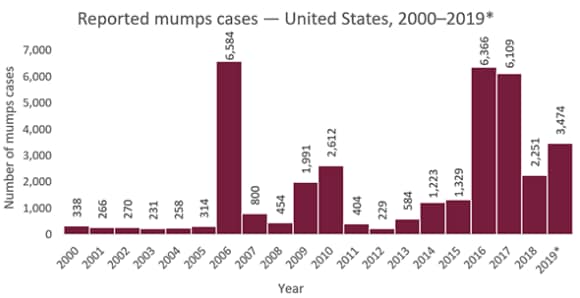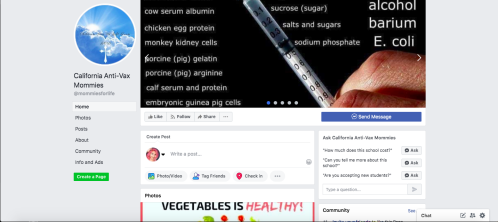The questions surrounding vaccinations have become prominent in recent months with a significant outbreak of both measles and mumps, and an outpour of postings and protests on social media, primarily on Facebook. With unexpected cases of measles in Washington and Oregon in January, and a closer to home outbreak of mumps in Philadelphia in February, the fear of real world consequences is also spreading rapidly.

According to the CDC, in 2019 there have been 626 reported cases of measles from January to April in 22 states, while the mumps have seen 426 reported cases from January to March in 34 states. The CDC also shows that this outbreak, and the cases, reported in 2018, are less than in previous years.
“They are two different kinds of outbreaks,” Susan Fitzgerald, director of Student Health Services at Cabrini University, said. “The mumps outbreak at Temple isn’t necessarily unvaccinated people…in the [MMR (measles, mumps and rubella)] vaccine, the mumps component is the least effective in creating immunity in the individual who is vaccinated.”
When it comes to the mumps and college campuses, this is nothing new. While there have been staggering outbreaks in the past few years, aforementioned with more cases reported, one of the biggest reported outbreaks was in 2006 beginning with college-aged students in the midwest. This outbreak totaled to 6,584 reported cases across 11 states and stands as the largest outbreak in the U.S. during the 21st century. There has been no speculation of whether or not the 2006 outbreak was linked to anti-vaxxers, but has been tied to the college lifestyle.
With a quick look on Facebook, there are a number of Facebook groups dedicated to fighting against vaccinations, most of them made up of parents. “California Anti-Vaxx Mommies,” one of the first groups to appear when searching for Anti-vaxx groups on Facebook, is a page dedicated to fighting against mandatory vaccinations in the U.S., originating in California. The owner of the page agreed to speak about their opinion regarding the issue, but has asked to remain anonymous as a representative for the page as a whole. “I don’t really consider myself a part of a movement,” the CAVM representative said. “Claiming you’re part of a movement seems very political to me and I don’t place myself a part of it. I [just] understand how our government works and the invisible choices they lead us to believe.”

While the stance against vaccinations has been around since the 1700s (the 1800s in the U.S.), the current influx of groups and protests could be a result of media attention.
In 2007, celebrity Jenny McCarthy claimed that her son was diagnosed with autism because of a vaccination. This was closely tied to a study done by Andrew Wakefield in 1998 linking the MMR vaccine to ‘behavioral regression’ in children. The study was fully disproven, and by 2010 Wakefield was exposed for fraud and his license to practice was revoked.
The main argument presented within the anti-vaxx community is that the population tends to take what the government presents as objective fact rather than questioning and speculating. “When people are presented with information that goes against their core beliefs and cognitive dissonance, it holds these people back,” The CAVM representative said. “If everyone would question everything and think for themselves…do the research and seek truth in all things, then we the people would be informed instead of opinionated!”

As a generalization of the community, their beliefs typically follow suit with those of Wakefield’s believing that mandatory vaccinations could lead to an increase in autism and other such conditions in children.
Given the debunking of the MMR vaccination having any ties with autism, there has been a spread of criticism against the movement relying on the medical data available. Despite this, followers of anti-vaxx have not been convinced and continue to grow in size; the population has been saturated with mothers of young children specifically.
Aside from creating an online debate, the movement has started to have real life consequences. The measles virus was eradicated from the U.S. in 2000, and has since made a return. Currently, in the year 2019, there have been 626 cases reported as of April which stands as the second biggest outbreak since its eradication. Due to such a drastic rise from previous years, with only 372 cases being reported in 2018 and 120 reported in 2017, it is speculated that the growing number of parents refusing to vaccinate their children could be a leading cause. These outbreaks are putting tremendous stress on the country and its medical professionals, and also on students currently studying in health care and medication.
“As a nursing student, I have to re-educate myself on diseases that were long thought to be eradicated,” Thomas Quinn, a senior nursing student at Temple University, said. “People are always wondering if they have the mumps or the measles and it’s our job to know the clinical symptoms of diseases that we otherwise wouldn’t have to worry about.”
Another troubling notion is the risk of spreading a fatal disease like the measles to somebody who cannot receive the vaccine. The measles vaccine is a live vaccine, meaning that eligibility to receive it excludes those with underlying health conditions, with a severe allergy, undergoing chemotherapy, etc. Despite this, the anti-vaxx movement shows no signs of relenting. “There will always be people who are unvaccinated,” Fitzgerald said. “Those of us who can, owe it to those who can’t. To protect them as well as ourselves.”


